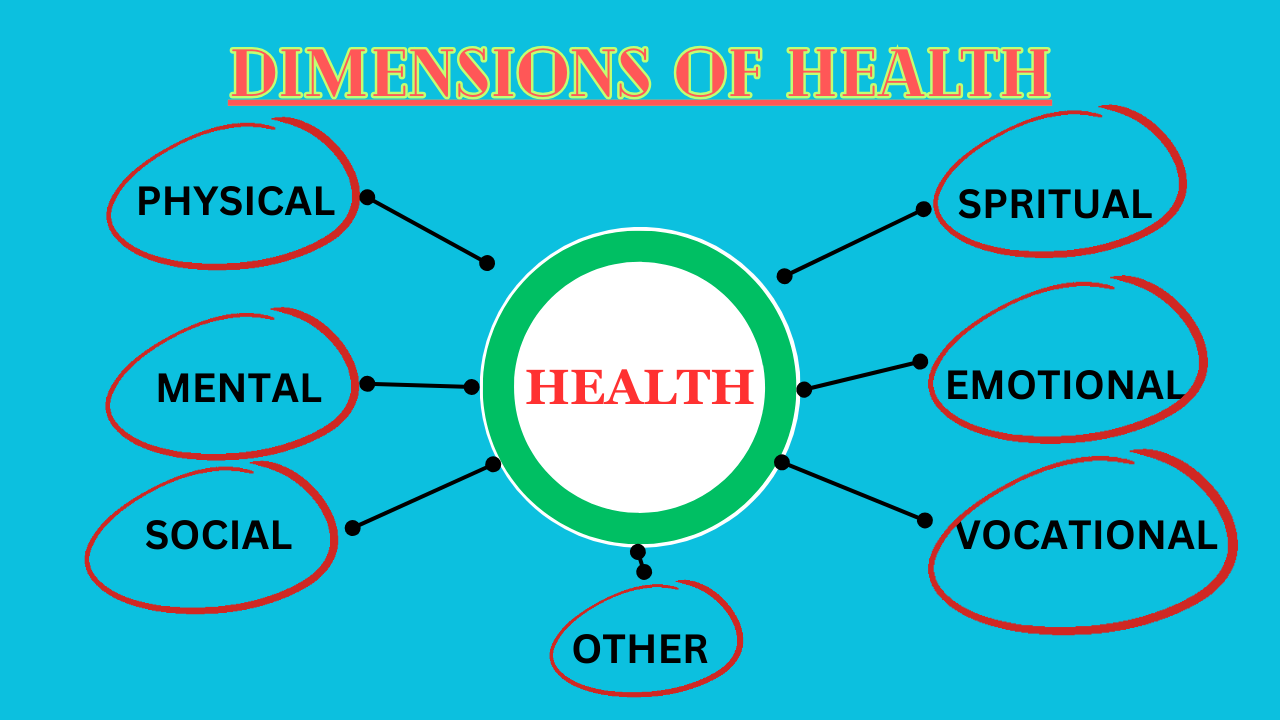Health has different definitions that have been used in different ways over time. Health can be promoted by promoting healthy activities such as regular exercise and adequate sleep, as well as by reducing or avoiding unhealthy activities or situations such as smoking or excessive stress. Some factors that affect health are due to individual choices, such as engaging in risky behaviors, while others are due to structural causes, such as whether society is organized in a way that makes it easier or more difficult for people to achieve this. necessary health services, but other factors, such as genetic disorders, are outside individual and group decisions.
Dimensions of Health-
Table of Contents
- Physical
- Mental
- Social
- Spiritual
- Emotional
- Vocational
- Other Dimensions
1. Physical Dimensions:
- Physical health means the perfect functioning of the body in which each organ is working in harmony with the maximum capacity.
- Physical health is achieved by exercise, a healthy diet, adequate rest and sleep, and no smoking or alcohol intake.
- To maintain proper physical health there is a need for taking safety precautions, and regular follow up with the health care providers.
Signs of Physical Health:
- A good complexion
- A clean skin
- Bright eyes
- Not too fatty
- A sweet breath
- A good appetite
- Sound sleep
- Regular activities of bowels and bladder
- Smooth, easy, and coordinated bodily movements
Evaluation of Physical Health:
- Self-assessment of overall health
- Inquiry about ill health and risk factors
- Inquiry to medications
- Standardized questionnaire for cardiovascular and respiratory diseases
- Clinical examination
- Nutritional and dietary history
- Biochemical and laboratory investigations
2. Mental Dimensions:
- Mental health is a state of balance between body and mind. Earlier the body and mind were considered two separate entities. But these are interrelated as physical illness can result from mental illness and vice versa.
How does mental illness influence physical health?

Characteristics of a mentally healthy person:
- A mentally healthy person will be capable of making personal and social adjustment
- A mentally healthy person is free from internal conflicts
- He faces problems and tries to solve them intelligently
- He has good self-control and balances rationally and emotionally
- He knows his needs problems and goals
- He has a strong sense of self-esteem
- He searches self-identity
- He lives a well-balanced life means being able to maintain a balance between work, rest, and recreation
3. Social Dimensions:
- an individual is socially healthy if he is able to maintain harmonious relationships with other members of the society in which he lives.
- Social health is rooted in the “positive material environment and positive human environment” which is concerned with the social network of the individual.
Social Dimensions of health include:
- Communication
- Intimacy
- Respect
- Equality
- Social functioning
4. Spiritual Dimensions:
- Spirituality means being in touch with a deeper self and exploring the purpose of life, as people believe in some force that transcends the physiology and psychology of human beings.
- It includes love, charity, purpose, principles, ethics, integrity, and hope of life.
- Meditation, prayers, or spiritual gatherings are organized to maintain spiritual health.
5. Emotional Dimensions:
- Emotional health is closely related to mental health and is considered an important element of health.
- Mental and emotional aspects of Health are now viewed as two separate entities for human life.
- Cognition is related to mental health whereas emotional health is related to the feelings of a person.
Emotional health includes:
- An emotionally healthy person has positive thinking and is capable of coping and adjusting self.
- An emotionally healthy person participates in all the activities that are related to personal growth and self-esteem.
- Emotionally well people have the ability to express feelings freely and manage feelings effectively.
- They are also aware of and accept a wide range of feelings in themselves and others.
6. Vocational Dimensions:
- The choice of profession, job satisfaction, career ambitions, and personal performance are all important components of this dimension.
- To be occupationally well, a person is ultimately doing exactly what they want to do in life and comfortable with their future plans.
Vocational dimensions of health can be assessed by:
- Assessing the satisfaction level at the job
- Facilities attached to the job
- The behavior of the management, administration, and colleagues on the job
7. Other Dimensions:
- Cultural dimensions
- Socio-economic dimensions
- Environmental dimensions
- Educational dimensions
- Nutritional dimensions
- Preventive dimension

